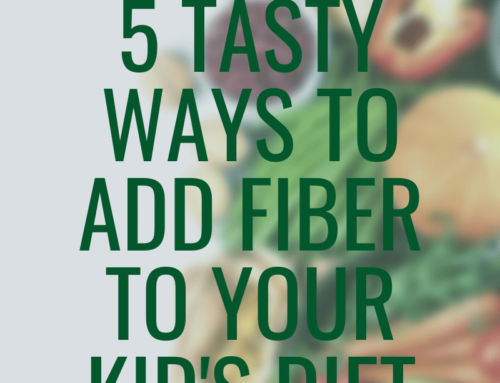Raising a Healthy Happy Eater: It Begins with a Healthy Mindset
Raising kids is a tough job. One of the biggest responsibilities – and biggest struggle – is feeding them. But, it’s not just feeding kids; it’s feeding kids healthy foods that they will actually enjoy eating. Does this sound complicated? It doesn’t have to be.
As a registered dietitian and mother, I have simple tips for raising a healthy happy eater. And this may surprise you: healthy eating has as much to do with your relationship with food as what is on the plate. Read on to learn more.
Watch Your Words
For kids, habits are formed by what they are exposed to. Your child’s relationship with food will most likely mirror your own relationship with food. So it’s important to watch your words when talking about food with your kiddos.
There are no “good” or “bad” foods
This is often a tricky perspective for parents to grasp because it’s ingrained in us to think of food as either good for you or bad for you. Thinking about food in this way can cause guilt and shame around foods that taste good or bring us comfort but may not be thought of as healthy. And no kid should feel guilty for eating foods that make them feel good.
By changing the language, you can cultivate a positive perception. Instead of categorizing foods as good or bad, just talk about food as food. For the families I work with, I always recommend using words that promote a more positive connotation like comforting, fun or tasty versus words like junk.
For example:
- Instead of “All you’ve eaten today is junk. You can have an apple now”
- Try: “I know those chips are fun to eat, but you’ve already had a bag today. How about a snack that will give you energy for practice later, like an apple?”
This language shift will set the tone for children to begin making food choices based on how they want to feel. It can also alleviate the guilt lots of kids feel around foods that are not thought of as healthy but are fun to eat.
Describe how food can help
Children are more likely to try new things if they understand the “why” behind it. I have definitely found this to be true with my own kids. So explain as much as you can in age appropriate language. Instead of convincing your child to eat broccoli because it’s healthy, try describing how it is healthy.
For example:
- Instead of: “Eat your broccoli, it’s good for you.”
- Try: “Have you tried your broccoli yet? Broccoli can help protect your heart.”
- Instead of: “You need to eat your carrots, they are the healthiest thing on your plate.”
- Try: “Oh look we’re having carrots! Did you know carrots can help you see better in the dark?”
This small change in the way you talk about food keeps mealtimes positive and may even get your kids curious or excited about different foods.

Don’t diet
A big thing to consider when raising a healthy happy eater is to avoid restrictive dieting yourself. Instead of dieting, let me introduce you to a better approach called Intuitive Eating. Have you heard of that before? Intuitive eating is when you listen to your body’s cues for hunger and fullness and honor those feelings with food that makes you feel good.
Dieting has been shown to have a negative effect on weight cycling, mental health and disordered eating habits. Whereas, adopting a more intuitive approach to eating has been shown to enhance satisfaction with life, increase body appreciation and decrease food-related anxiety.
When we diet we get distracted by messages in the media about what we think we should be eating (good food) or avoiding (bad food). That’s when we begin to ignore our body’s cues. When we ignore our body’s cues, we make food choices based on what we think we should do instead of what we actually find satisfying.
It’s important to teach kids to make food choices that are not only nourishing but also satisfying. Because, when we enjoy the foods we eat we tend to be satisfied with less food, absorb more nutrients, and digest our food better. Let’s face it, food is only nourishing if it’s actually eaten so we might as well enjoy what we eat!
Leaning into a more intuitive approach to eating may be a new concept for you. I help families, just like yours, adopt an intuitive eating lifestyle. And working on intuitive eating principles as a family will enhance your children’s overall attitude and relationship with food. Guess what? It enhances your health, too.
Model Healthy Eating Habits
Another great strategy for raising a healthy happy eater is to model healthy eating habits yourself. Kids absorb so much more than we realize and they notice when we say one thing but do another. Sometimes, your actions may be more impactful than your words.
Create balanced meals (and eat them as a family)
- Serve foods from all of the food groups. Each food group has its own unique nutrient profile which benefits our bodies differently. Creating meals with all of the food groups ensures your kids are getting enough nutrients, increases exposure to a variety of foods and helps slow down the digestion process to keep them fuller longer.
- For example, an apple and peanut butter offers a greater variety of nutrients for your kiddo than a plain apple. Plus, the peanut butter will keep them feeling fuller longer.
- Serve nourishing foods with fun foods. I often have to remind the parents that I work with that balance is not just about food groups but also satisfaction. Healthy foods are only healthy if your kid actually eats them. So, you may need to serve something to help enhance the flavor and satisfaction of the healthy stuff.
- Add butter, dressing or cheese to vegetables
- Add chocolate chips to the trail mix
- Add caramel or chocolate drizzle to fruit slices
Keep in mind, the nutrition is the same in the broccoli whether you add butter or not. Isn’t it better to have your kids eat their broccoli with a little butter than not eat it at all?
Practice mindful eating
While it might sound like Intuitive Eating, mindful eating is a bit different. Mindful eating is being fully attentive to your food and using all of your senses as you eat. Becoming a more mindful eater enhances satisfaction by creating a more sensory experience with food. It also helps us feel our first physical signs of fullness sooner so we can stop eating when we are comfortably full.
Encourage your kids to listen to their own bodies and slow down when they eat. Model this yourself by putting your phone away at the table, setting your fork down between bites and chewing your food longer. Engage in meaningful conversations with your family around the table. Not only will this help your family to eat more slowly, but it will also foster interactions that maintain strong family connections.
Although it may feel corny, I tell my clients to verbalize feeling full with their kids so they can understand the process. At the end of your meal when you are comfortably full try saying something like, “this meal was delicious but my tummy is telling me I’m full so I’m going to stop eating”. (if there is food left on the plate you can always save it for leftovers.)
Exposure to a variety of foods
The key word here is exposure. Kids sometimes need 15-20 exposures to a food before they try it. An exposure is anytime your child sees or interacts with a food. They may look at the food, play with the food, talk about the food or ignore the food.
But, whatever they do, even if they don’t eat the food, you’ve provided an exposure by serving it to them. And that is a plus one for you. Expose your kids by serving a variety of new and healthy foods often, explain the health benefits in positive, age-appropriate language and then let them do what they do.
Ignore Picky Eating Habits
Probably the most frustrating part of feeding kids is the picky eating. I work with families on a regular basis who are stressed out with the way their kids eat, or rather, don’t eat. And I always tell them to ignore the picky eating behavior.
In my experience, parents can so quickly feel like a failure with picky eating struggles or take it personally. Picky eating isn’t a kiddo trying to be a pain in the butt, rather that they’re overwhelmed, have sensory things going on or simply need more practice with a food. So be patient with your kid and with yourself.
Here are a few tips to help you to ignore picky eating habits which will make mealtimes so much more peaceful for the entire family.
- Don’t negotiate. Your job as the caregiver is to provide nutritious foods. Your child gets to decide what and how much they want to eat. You cannot force a person to eat and trying to negotiate this with your child will only create an unnecessary power struggle.
- Don’t praise for trying new foods. While praising your child for trying something new may seem like a good idea, it can actually set your child up to ignore their body’s natural cues. They may begin to make food choices based on the praise they receive rather than what they find satisfying.
- Don’t reward or punish with food. Rewarding “healthy eating” with dessert creates that good foods versus bad foods mentality. It also undermines the healthy habits you are working to create and can cause your child to ignore their body’s cues for hunger or fullness.
What you can do to help your child at mealtimes:
- Refer to your child as a curious eater rather than picky eater
- Serve them their meals and explain what is on the plate
- Talk about how much you are enjoying your food (“That’s eggplant on your plate and this is my favorite way to eat eggplant!”)
- Engage in other conversations
- Let your child be
This may take a bit of practice but the more you bring attention to picky eating behavior, the more frustrating it will become for everyone. At the table, try to focus on anything but how your kid is eating.
Wrap-up
Raising kids is a tough job. We may not do everything right all the time, but we do a lot of things right most of the time. And, most of the time is more than ok. Raising a healthy happy eater is more than just eating healthy. It’s creating healthy habits and attitudes around food.
As a dietitian and mother, I empower busy families to help create those habits. Contact me for more information on how I can help your family. You’ll leave my (virtual) office with an action plan you’re excited to follow with your whole family – no more stress!





Leave A Comment